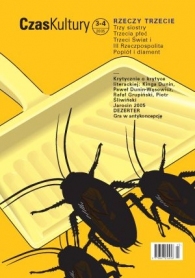Trzecia płeć / Lesbianizm i cross-gender w tubylczych kulturach Ameryki Północnej
The Third Gender / Lesbianism and Cross-Gender in Native North American Cultures
Author(s): Waldemar KuligowskiSubject(s): Cultural Essay, Political Essay, Societal Essay
Published by: Stowarzyszenie Czasu Kultury
Summary/Abstract: The European colonisation of North America was inherently related to the cruel mutilation of the rich native culture. The native inhabitants were forced to live in reservations and were subjected to mass brainwashing. One of the effects of this was the instilment of homophobia, which was widespread on the old continent, but hitherto unknown to the open-minded natives. Before this time, homosexual people were not looked down on in Native American communities. On the contrary, many of them enjoyed great respect. Lesbians and representatives of the third gender (i.e. those who displayed both male and female features) performed important functions in their tribes. They were warriors, guardians of the hearth and home, visionaries, healers and interpreters of dreams. They lived in harmony with nature with a culture reflecting the sacred circle of life, encompassing male and female homosexuality at its extremes and a multitude of sexual identities in between. This circle also allowed the changing of one's position within it, a concept which was incomprehensible to the Europeans. The protective arm of the sacred circle encompassed all the members of its tribe without exception. The introduction of European rules among the Native Americans led to “an almost complete upsetting of the previous relations between men and women, between the first, the second and the third gender”. The native cultures could not withstand the pressure of the white man’s absolute power. Fortunately, the counter-cultural social call of the 1960’s and 70’s enabled the revival of the native traditions that, by then, had become almost extinct. The native lesbians and representatives of the third gender began openly voicing their opinions in public. Nevertheless, their appeals for equality and tolerance remained far behind the activities of the ‘more equal’ white gays and lesbians who ignored their Native American roots and even abused them, in as much that they failed to value the relationship between sexuality and spirituality, closeness to other tribe members and the importance of religious rituals. Hence the Native American lesbians had to find even more courage and strength in order to face the numerous adversities. So far, they have been able to express their long-hidden orientations and hardships through literature. Numerous Native American women have been winners of the Audre Lorde International Poetry Competition, the Sappho Award of Distinction and many other relevant distinctions in the literary field. It is now time for the social acceptance and approval of their activities.
Journal: Czas Kultury
- Issue Year: 2005
- Issue No: 03-04
- Page Range: 15-29
- Page Count: 15
- Language: Polish
- Content File-PDF

